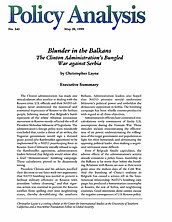The Clinton administration has made one miscalculation after another in dealing with the Kosovo crisis. U.S. officials and their NATO colleagues never understood the historical and emotional importance of Kosovo to the Serbian people, believing instead that Belgrade’s harsh repression of the ethnic Albanian secessionist movement in Kosovo merely reflected the will of President Slobodan Milosevic of Yugoslavia. The administration’s foreign policy team mistakenly concluded that, under a threat of air strikes, the Yugoslav government would sign a dictated peace accord (the Rambouillet agreement) to be implemented by a NATO peacekeeping force in Kosovo. Even if Milosevic initially refused to sign the Rambouillet agreement, administration leaders believed that Belgrade would relent after a brief “demonstration” bombing campaign. Those calculations proved to be disastrously wrong.
President Clinton and his advisers justified their decision to use force with two arguments: that NATO bombing was needed to prevent a Serbian military offensive in Kosovo with attendant “ethnic cleansing,” and that vigorous action was essential to prevent the Kosovo conflict from spilling over into neighboring states, thereby destabilizing the southern Balkans. Administration leaders also hoped that NATO pressure would undermine Milosevic’s political power and embolden the democratic opposition in Serbia. The bombing campaign has been wholly counterproductive with regard to all three objectives.
Administration officials have committed miscalculations eerily reminiscent of faulty U.S. assumptions during the Vietnam War. Those mistakes include overestimating the effectiveness of air power; underestimating the willingness of the target government and population to fight for their homeland; and demonizing the opposing political leader, thus making a negotiated settlement more difficult.
Even if Belgrade finally capitulates, the adverse effects of the administration’s actions already constitute a policy fiasco. Instability in the Balkans is far worse than before the bombing. Relations with Russia are now at their worst point since the darkest days of the Cold War. And the bombing of China’s embassy in Belgrade has caused a serious rift in the Sino-American relationship. NATO’s bombing campaign has produced a humanitarian catastrophe in Kosovo, the rest of Serbia, and neighboring countries. Good intentions alone cannot excuse the negative consequences of U.S. Kosovo policy.

This work is licensed under a Creative Commons Attribution-NonCommercial-ShareAlike 4.0 International License.

